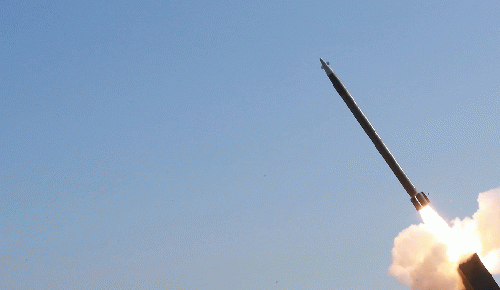Russia has called on the United States to resume bilateral efforts towards nuclear disarmament and stop fueling speculations about the possibility of a limited nuclear war, as both countries are poised to leave a crucial Cold War-era arms control treaty.
Speaking at the Disarmament Conference in Geneva, Russian Foreign Minister Sergey Lavrov warned the ongoing row over Intermediate-Range Nuclear Forces Treaty (INF), which has been suspended by both sides, showed that nuclear weapons reduction mechanisms between Moscow and Washington had exhausted itself and a multilateral approach was needed.
"As the INF Treaty crisis has shown, nuclear disarmament progress on the bilateral Russian-US basis has exhausted itself. Time is ripe to give serious thought to how to make the nuclear weapons control process multilateral and acceptable for all countries involved," he said.
Singed in 1987, the treaty banned the US and the former Soviet Union from creating ground-launched nuclear-capable missiles with ranges from 500 to 5,500 kilometers.
Lavrov said that any multilateral process needed to be based upon the principles of integral and indivisible security.
"In the meantime, instead of a constructive response we have been hearing only speculations about a resumption of nuclear tests, deployment of attacks systems in space and even of the possibility of starting a limited nuclear war," he said, adding Russia kept all weapons control proposals in place.
"It may become a reality, though, if we fail to jointly identify a sound alternative to the destabilization of the international situation, to the further aggravation of contradictions among states and to upsetting the existing system of multilateral weapons control agreements," he warned.
US President Donald Trump suspended the INF for three months earlier this year, warning that he would withdraw completely in August unless Russia dismantles its new 9M729 ground-launched cruise missile.
Russia, however, has rebuffed the claim by showcasing the missile to journalists and revealing many of its sensitive specifications to ensure the international community that the Trump administration is being dishonest.
The Russian Foreign Ministry reported that Moscow would not destroy the missile because of "baseless" US claims.
"We can't destroy the 9M729 [missile] complexes, which Washington had declared in violation of the treaty without any reason," Russia's Foreign Ministry asserted in a statement on Tuesday.
At the same time the Pentagon plans to begin flight tests this year of two types of missiles that have been banned for more than 30 years by a treaty from which both the United States and Russia are expected to withdraw in August, defense officials said.
The projects include a low-flying cruise missile with a range of about 1,000 kilometers and a ballistic missile with a range of roughly 3,000 to 4,000 kilometers, military officials who could not reveal their name under the Pentagon's security rules told the media.
The Pentagon's new ground-launched cruise missile (GLCM) might be ready for deployment within 18 months, Michelle Baldanza, a Pentagon spokeswoman said.
One defense official said it was possible that the intermediate-range ballistic missile could be deployed on Guam, a U.S. territory, which would be close enough to Asia to pose a potential threat to China and Russia.
Besides Michelle Baldanza said that Washington would stop the projects if Moscow agreed to a deal to rescue the INF treaty before August.
https://balticword.eu/us-intermediate-range-ballistic-missile-could-be-deployed-on-guam/






